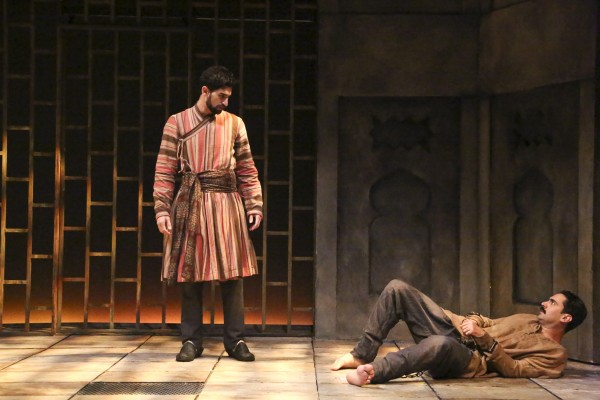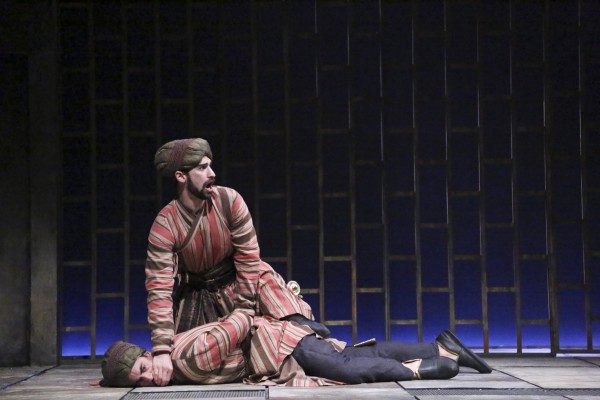It is extremely unusual in less than a month, to come across two pieces of theatre that seem to be spores that blew in from another planet.
Man Covets Bird at the 24th Street Theatre did feel that way. Its author, an Irish-born Tasmanian with the unlikely name of Finegan (one “n”) Kruckemeyer, delivered a play for young audiences of all ages that felt totally fresh — an experience to savor and to which words could not fully do justice. You had to sit through it. (You still can; it ends November 22.)
Now comes another, entirely different, entirely extraordinary experience in the smaller of the Geffen Playhouse’s two theatres. The West Coast premiere of Rajiv Joseph’s Guards at the Taj, one of the most eccentric and gripping two-handers in memory. It is nearly new (New York’s Atlantic Theatre mounted the premiere earlier this year), but I can guarantee that it is as unpredictable and as arresting as anything you may have experienced on stage since the recent Waiting for Godot at The Mark Taper Forum. And that is saying plenty.
How otherworldly is it? Exceptionally so, as a richly dramatic page pulled from violent myth and history, yet filled with joshing and clowning. Beginning with the time and place — Agra, India, 1648 — we are looking at a pair of lowly guards whose assigned role in work and life is to watch over — yet not see — the newly completed Taj Majal, deemed the most architecturally exalted creation in the world. The job also calls for maintaining absolute stillness and silence. No speaking allowed. Which is easier said than done.

So how do you make a play out of that? And where can it take us? Worlds away, to a boundless, complex, internal universe filled, like our planet, with the mysterious collisions of beauty, mirth and violence.
Mercifully, Joseph, also the author of Bengal Tiger at the Baghdad Zoo (a Pulitzer finalist) and Mr. Wolf (a mystery focused on child abduction and staged last spring at South Coast Repertory), is not a writer who thinks in straight lines. Like Samuel Beckett, he can make something out of nothing. And two silent guards, standing at attention in front of a Taj they’re not allowed to look at, can’t help invoking shades of Godot’s Vladimir and Estragon. But with a difference. The Beckett is more stark and raw. The circuitous paths and byways of Joseph’s original mind are closer to the elegance of Arabic calligraphy, with swirls and swoops and sinewy curlicues.
Guards at the Taj is an intermissionless 90-minutes that is as much stand-up comedy as theatrical tone poem. It takes us on wild flights of fancy, embracing schemes, philosophies, dreams, questions and rationalizations — until bloody reality sets in, when it veers closer to Martin McDonagh’s Lieutenant of Inishmore. Call it a meditation on right and wrong, good and evil, friendship and enmity, subjugation and freedom, loaded with contrast and spoken in a contemporary vernacular that feels spontaneous and completely natural.

Playful banter alternates with unspeakable cruelty; moments of real tenderness dissolve into infinite anguish, and all of this is rife with irony and a deep, dark kind of whimsy. It’s hard to recall any play based on such an unpromising start going on to deliver a greater wallop on a wider range of emotions.
To describe Guards at the Taj any further would be to ruin the perfect shock of its experience. This play demands to be discovered one step at a time. For this outing, Joseph is fortunate to be working with director Giovanna Sardelli, an acknowledged friend and frequent collaborator with whom he shares the advantage of a lengthy professional relationship. Given what we witness on stage, it’s clear they understand each other perfectly.
Greatly enhancing the superior quality of the Geffen production is the work of a beautifully integrated creative team. Sardelli’s pacing, the control she’s exerted over the minute details in the performances of Raffi Barsoumian as the rule-bound Humayun, and Ramiz Monsef as the much looser, happy-go-lucky Babur, are tuning-fork perfect. These two actors are superbly matched, bouncing off each other as real buds or brothers might, spotting one another’s responses before they are even completed.
Simplicity and economy are the production’s hallmarks — from the play’s unhurried brevity to its lively conversational tone. Sardelli’s clarity in guiding the action is enhanced by the clean lines of Tom Buderwitz’s impressive sets, Lap Chi Chu’s nuanced lighting (a significant element in this circumstance), Denitsa Bliznakova’s nicely detailed costumes and Vincent Olivieri’s unobstructed sound design, which includes the twitter of birds. The uncredited and highly unconventional props, a key component of the play’s unfolding, more than likely fell within the purview of Buderwitz or Bliznakova or both.

As a person slow to be won over by Joseph’s writing over the years, it’s a thrill to witness such dazzling maturation in what may well be this prodigious playwright’s finest play to date. The stars have aligned in the heavens and not only above the Taj, but above The Geffen. Do not miss this lucky chance to see them.
Top image: l-r, Raffi Barsoumian and Ramiz Monsef in Rajiv Joseph’s Guards at the Taj at The Audrey Skirball Kenis Theatre of The Geffen Playhouse.
Photos by Michael Lamont.
WHAT: Guards at the Taj
WHERE: Audrey Skirball Kenis Theatre a The Geffen Playhouse, 10886 LeConte Avenue, Los Angeles, CA 90024.
WHEN: Tuesdays-Fridays, 8pm; Saturdays, 3 & 8pm; Sundays, 2 & 7pm. Ends November 15.
HOW: Tickets, $60-$82, are available online at www.geffenplayhouse.com or at 310.208.5454 or in-person at the Geffen Playhouse box office.
